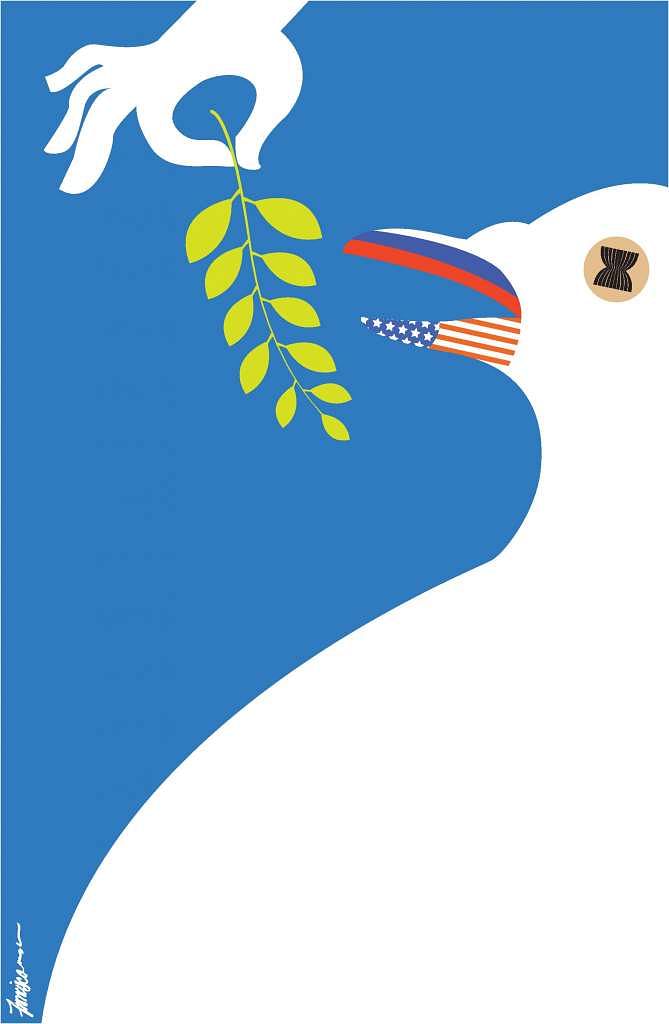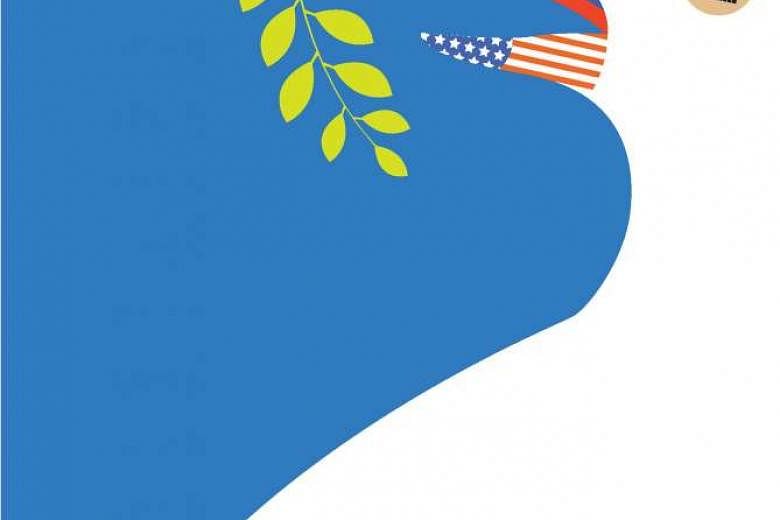Travelling in China and the Philippines last year along with a bunch of other Jefferson Fellows, I asked Will Englund, the Pulitzer Prize-winning journalist of The Washington Post, whether this was the first time he'd got a close look at Asia.
"Only if you don't count the 14 years I spent in Moscow, capital of the biggest Asian nation," he drawled, catching me by surprise.
The distinguished Mr Englund was right, of course. Two-thirds of Russia's vast landmass lies in Asia, a fact that few recognise. That's probably because territory east of the Urals is sparsely populated, even as it is mineral-rich. And Moscow itself ignored it for decades in its quest to be a European power.
These days, though, more out of necessity than anything else, it has begun to look eastward. Indeed, its latest Asia turn was announced a year before the US announced its own rebalance to Asia.
How serious is it this time and what does it portend?
Russia's tilts to the East aren't a new phenomenon. Then Soviet leader Mikhail Gorbachev announced one big turn with his famous Vladivostok Address in 1986 where he said the Soviet Union will "seek to lend dynamism to its bilateral relations with all countries situated here without exception". The port city of Vladivostok is close to Russia's borders with China and North Korea. However, internal convulsions and other preoccupations in its European near-abroad queered the pitch almost immediately.

Now, Russian President Vladimir Putin is again echoing those sentiments. This time, is it different? Only time will tell.
What's not in doubt, though, is that Moscow has good reason to stress, as a senior Russian official did in a conversation with me some months ago, that "the eagle on the Russian flag looks in both directions". As the world's economic weight shifts inexorably towards Asia, Russia knows the region is central to its own future, both for economic and strategic purposes. Second, it must surely be aware that if it is to entrench itself in Asia, it has only a limited window, given the way the strategic pieces are falling into place every week. Time is not on its side.
UKRAINE AND U.S. SLIP-UPS
What's complicating things is that its actions in the Ukraine, and before that Crimea, have made it something of a strategic untouchable for the West. Even in Asia, which is wary of Big Powers bullying smaller folk in their own yard, the Crimea action, particularly, was seen with dismay.
To give the devil his due, though, it must be acknowledged that US policy towards Russia did contribute to events in Ukraine. Fouling up ties with Russia was one of the big slip-ups of the Hillary Clinton State Department.
For years Russia had watched with unease as Poland, Hungary and the Czech Republic joined Nato in 1999. Next came seven Central and Eastern European countries, including Bulgaria, Estonia, Romania and Slovenia. The most recent members, Albania and Croatia, were admitted in 2009. To cap it all, Nato officially recognised Bosnia-Herzegovina, Georgia, Macedonia and Montenegro as aspiring members.
The sense of encirclement was acute. Today all major Russian parties are agreed that the West reneged on a promise to not expand Nato eastward. (It must be quickly added that the West denies there ever was such a commitment.)
But, under Mrs Clinton, US policy also tried to play off Prime Minister Dmitry Medvedev - who was President from 2008 to 2012 - against Mr Putin, who was then Prime Minister - not quite realising how resilient Mr Putin can be. Mr Medvedev had no stomach for a revolt and the effort was wasted, even counter- productive, as Mr Putin only got more wary of Washington.
The US even managed to upset Mr Medvedev. The Russian leader had gone along with the UN resolution on Libya that brought the intervention, then felt double-crossed when the West went much further than they had promised. When Libyan ruler Muammar Gaddafi was killed in October 2011, the Russians saw it as a direct affront. And, two months later, when protests broke out in Moscow against rigged Duma elections, Mr Putin blamed Mrs Clinton personally for inciting them. This was the background against which Moscow seized the Crimea and then got its proxies to destabilise Ukraine.
The wise thing is to condemn those actions severely, but also to not ostracise Russia entirely. That is the approach many Asian nations have taken and indeed is the wise one. It is getting ever more important that all lines to Moscow be kept open, especially with Russia's Pacific fleet poised to become its largest sword arm, from smallest currently.
In terms of rebalancing of assets, this is an even bigger shift proportionately than what the US is involved in. Russia is allotting new hunter-killer and ballistic-missile submarines to the Pacific fleet and, last year, established an air wing to police the sweep of territory covering the Arctic Circle, the Pacific and Japan.
RUSSIA'S TIES WITH CHINA
As long as the Russians are in it for themselves, Asia does not have to worry. Moscow's power-projection capabilities have their limits. But the dynamics change when Russian strength is added on to another power, say China's. Indeed, this is one strategic relationship swiftly developing, even as old ones, such as Russia-India, fray.
Russians were always considered too proud to play second fiddle to anyone, but, pushed to the wall by sanctions, his economy in tatters as oil prices plunge, Mr Putin appears willing to swallow his pride with Beijing. And he even has domestic backing for this: a paper written for the Lowy Institute of Australia cites a recent Levada Centre poll that showed 80 per cent of Russian respondents had a favourable view of China. At the same time, 81 per cent had a negative view of the US.
Still, some think Mr Putin is merely being tactical and is hardly the type to accept a junior partnership. "There is no evidence that Russia is ready to accept a secondary role to China," says a senior Asian diplomat familiar with Russia. "That is overstating the case. Russians are a very proud people."
To some extent that is probably correct. Many Russian military exercises seem to be performed with China in mind, even as it also conducts drills with the People's Liberation Army (PLA). And there is no question that Russia's tightest security relationship in South-east Asia is with Vietnam, which has an increasingly testy relationship with Beijing. Aside from cooperation in energy, Russia-Vietnamese strategic ties are growing by the day. These days, more Vietnamese show up in Moscow for training and other purposes than any other Asian state, China and India included. Indeed, Moscow has stood up to Beijing in being firm about drilling for oil alongside Vietnam in waters claimed by China. At the same time, much to the discomfort of the US, which is building up its own ties with old foe Hanoi, Russia uses its Cam Ranh Bay airbase to refuel its bombers operating in the western Pacific.
Russia has also been quietly mediating on the Vietnam- China dispute over who controls the Paracel Islands. Those efforts are making some progress, according to some diplomatic sources. Besides, with Mr Nguyen Tan Dung to soon end his term as Vietnam's Premier, his influence over Vietnam's security policies is set to diminish. It was Mr Dung who had made the most significant outreach attempts with the US, including backing the Trans-Pacific Partnership that excludes China.
One person who recognises the strategic significance of all this is Mr Shinzo Abe. The Japanese leader has been repeatedly pressing for the West to engage with Mr Putin, saying he is critical to handling Middle East issues. Japan had joined the sanctions imposed on Moscow - and exclusion from the G-8 - but Mr Abe is making it clear that he thinks dialogue with Mr Putin is essential.
While Mr Abe masks this as intended to tackle Middle East issues, his real motives may well be closer home, including the contest for territorial waters and worry over North Korea. Indeed, there are many who believe that China's tough postures on Asian maritime issues stem partly from confidence that Russia has its back. Left to himself, Mr Putin may well prefer a triangular relationship that takes in New Delhi and Beijing but he no longer has the clout to make that come about.
It is for all these reasons that Asean leaders, soon to meet Mr Barack Obama at Sunnylands, California, should place a word in the US President's ear about Russia. Its economy may be on the ropes currently, but from arms to nuclear equipment sales and energy supplies, Russia is a serious player, and poised to play a bigger role in Asia. A neutral Russia could be a healthy presence in South-east Asia. Aligned, she complicates the picture.
One way out of the impasse is to find a face-saving solution for Russia to ease off on Ukraine, in exchange for the lifting of sanctions. A remake of US-Russia ties is long overdue and is in the interests of all, the US included. Secretary of State John Kerry's long meeting with Mr Putin in Moscow was the first overt step of the reset and has led to a better appreciation of their mutual positions on Syria. Before he leaves office, Mr Obama would do well to push for full normalisation of ties. Who knows what might happen if Mrs Clinton steps into his shoes next January.



